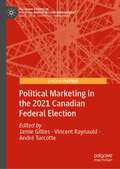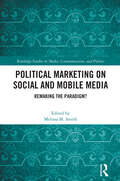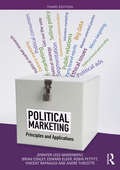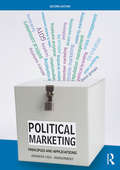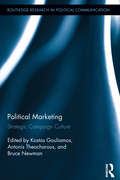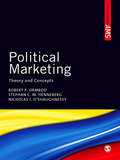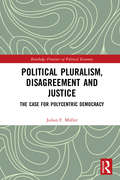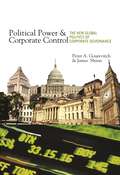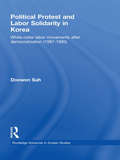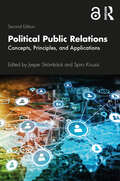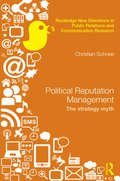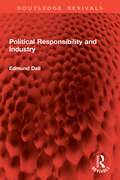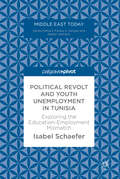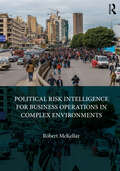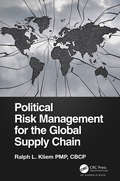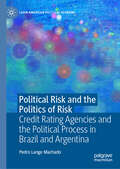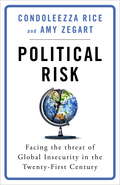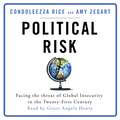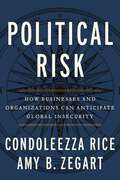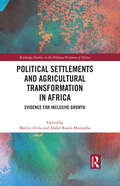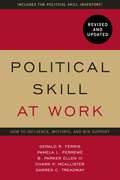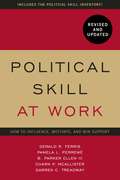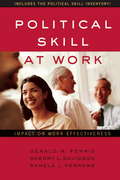- Table View
- List View
Political Marketing in the 2021 Canadian Federal Election (Palgrave Studies in Political Marketing and Management)
by Jamie Gillies André Turcotte Vincent RaynauldThis book offers a fresh take on the dynamics of the 2021 Canadian federal election by focusing on elements pertinent to political marketing and branding rather than just the horse race and campaign dynamics. Chapters by leading and emerging political marketing academics from different disciplines, including communications, political science and political management, are included as well as contributions from practitioners in different fields related to political marketing such as pollsters. Some chapters are collaborations between leading academics and practitioners, which provide new insights into the dynamics of political marketing that enrich this edited volume. The book’s content takes our current understandings of Canadian political marketing in new directions.
Political Marketing on Social and Mobile Media: Remaking the Paradigm? (Routledge Studies in Media, Communication, and Politics)
by Melissa M. SmithThis book explores how social and mobile media have been used in political campaigns since 2008, examining how social media are already being implemented as well as how these types of messaging platforms might be used in the future.Chapters in this book discuss how social and mobile media are becoming imperative when marketing a candidate’s image, distributing messages, fundraising, and getting out the vote. While some chapters delve into a particular candidate’s campaign, others discuss several campaigns in light of a particular political objective. Authors also discuss the use of political messaging and its possible role in political polarization through misinformation and interference. In particular, the book seeks to demonstrate a greater reliance on social and mobile media for political messaging, thus ushering in a possible new marketing paradigm.This book will interest researchers and students in the areas of political communication, political science, government, public affairs, and social and digital media.
Political Marketing: Principles and Applications
by Edward Elder Brian Conley Jennifer Lees-Marshment André Turcotte Robin Pettitt Vincent RaynauldSubstantially revised throughout, the third edition of Political Marketing continues to offer students the most comprehensive introduction to this rapidly growing field. It provides an accessible but in-depth guide to what political marketing is and how it is used in practice and encourages reflection on how it should be used in the future. New Features and benefits of the third edition: Fully updated throughout with new research on emerging practices in the field and ethical implications such as the use of big data, authenticity and the limitations of voters as consumers in light of Brexit; A new employability section on political marketing in the workplace; Extensive pedagogical features including new peer-reviewed case studies, democratic debates, and fully updated practitioner perspectives, best practice guides, and class discussion points and assessments. Led by a leading expert in the field and including contributions from other key academics in the field, this textbook is essential reading for all students of political marketing, parties and elections, and comparative politics.
Political Marketing: Principles and Applications
by Jennifer Lees-MarshmentSubstantially revised throughout, Political Marketing second edition continues to offer students the most comprehensive introduction to this rapidly growing field. It provides an accessible but in-depth guide to what political marketing is and how it is used in practice, and encourages reflection on how it should be used in the future. Features and benefits of the second edition: New chapters on political branding and delivery marketing; Expanded discussion of political public relations, crisis management, marketing in the lower levels of government and volunteer-friendly organizations; Examination of the new research on emerging practices in the field, such as interactive and responsive leadership communication, mobile marketing, co-creation market research, experimental and analytic marketing, celebrity marketing and integrated marketing communications; and Extensive pedagogical features, including 21 detailed case studies from around the world, practitioner profiles, best practice guides, class discussion points, an online resource site and both applied and traditional assessment questions Written by a leading expert in the field, this textbook is essential reading for all students of political marketing, parties and elections and comparative politics. This book is supported by an online resource site, www.political-marketing.org/, which is annually updated with new academic literature, audiovisual links and websites that provide further reading and links to clips for use in teaching political marketing.
Political Marketing: Strategic 'Campaign Culture' (Routledge Research in Political Communication)
by Bruce Newman Kostas Gouliamos Antonis TheocharousA guiding principle in creating Political Marketing has been to examine the ways in which culture, politics, and society interrelate in the field of political marketing. In the course of the book, the editors and contributors consider ‘culture’ as a distinctive concept with transformative capacities that need further and deeper development in the engineering of the political marketing process. This may be introduced and, consequently, lead to broad formulation of a ‘campaign culture’. Indeed, understanding and adapting a broader ‘campaign culture’, political marketing models may be seen as sets of pathways of key resources resulting viability in human assets, forms of influence, class stratification, alternative flows of information or networking and intercultural knowledge – sharing activity. This book consists of 18 chapters which deal with aspects of political marketing and ‘campaign culture.’ Theoretical chapters are found first, followed by two chapters that deal with theoretical issues which became a subject of research. Next presented are the articles that study aspects of electoral behavior, followed by the papers that analyze aspects of nationalism & national identity. Finally, the book concludes with three case studies on various issues in political marketing.
Political Marketing: Theory and Concepts (SAGE Advanced Marketing Series)
by Stephan C Henneberg Robert P. Ormrod Nicholas O'ShaughnessyPolitical Marketing: Theories and Concepts provides students with a valuable and critical understanding of how political parties use marketing to attain their aims. Unlike other textbooks, this text explicitly focuses on the theoretical underpinnings and cutting edge concepts used by political parties, allowing students to gain key insights into how they win elections and remain in power. With an engaging and thought provoking topic selection, these field-leading authors have ensured that this often complex and theoretically advanced topic is clearly accessible for a student audience and novice researchers.<P> Key features of each chapter include:<P> - Short chapter introduction and learning summaries<P> - Discussion questions to share in the classroom<P> - Annotated suggestions for further reading<P> - Lists of key terms to consider<P> This text is essential reading for advanced undergraduate and postgraduate students on political marketing courses.<P> Dr Robert P. Ormrod, University of Aarhus, Denmark<P> Dr Stephan C. Henneberg, University of Manchester<P> Professor Nicholas J. O'Shaughnessy, Queen Mary, University of London
Political Pluralism, Disagreement and Justice: The Case for Polycentric Democracy (Routledge Frontiers of Political Economy)
by Julian F. MüllerThis book poses the question: How can we organize society in such a way that our disagreement about facts and norms works to the benefit of everyone? In response, it makes the argument for polycentric democracy, a political arrangement consisting of various political units that enjoy different degrees of independence. <P><P>It is argued that to progress towards justice, we first need to change our attitude towards reasonable disagreement. Theorists have always viewed reasonable disagreement as nuisance, if not as a threat. However, this work puts forward that the diversity of perspectives which underlie reasonable disagreement should be viewed as a resource to be harvested rather than a threat to be tamed. Resting on two key arguments, the author proposes the idea of polycentric democracy as the most capable method of making pluralism productive. The book explores what such a political order might look like and concludes that only an institutional system which is capable of profiting from diversity, such as polycentric democracy, might reasonably be expected to generate an overlapping consensus. <P><P>Continuing in the tradition of Karl Popper and Friedrich August von Hayek, this book lies at the intersection of philosophy, political economy and political theory. It will be of great interest to academics and scholars working in philosophy, politics and economics.
Political Power and Corporate Control: The New Global Politics of Corporate Governance
by James Shinn Peter A. GourevitchWhy does corporate governance--front page news with the collapse of Enron, WorldCom, and Parmalat--vary so dramatically around the world? This book explains how politics shapes corporate governance--how managers, shareholders, and workers jockey for advantage in setting the rules by which companies are run, and for whom they are run. It combines a clear theoretical model on this political interaction, with statistical evidence from thirty-nine countries of Europe, Asia, Africa, and North and South America and detailed narratives of country cases. This book differs sharply from most treatments by explaining differences in minority shareholder protections and ownership concentration among countries in terms of the interaction of economic preferences and political institutions. It explores in particular the crucial role of pension plans and financial intermediaries in shaping political preferences for different rules of corporate governance. The countries examined sort into two distinct groups: diffuse shareholding by external investors who pick a board that monitors the managers, and concentrated blockholding by insiders who monitor managers directly. Examining the political coalitions that form among or across management, owners, and workers, the authors find that certain coalitions encourage policies that promote diffuse shareholding, while other coalitions yield blockholding-oriented policies. Political institutions influence the probability of one coalition defeating another.
Political Power and Environmental Sustainability in Gulf Monarchies (Contemporary Gulf Studies)
by Tobias ZumbraegelThis book offers a new perspective about the Gulf Arab states entering a post-oil era by looking at the political factors behind the green transformation. It discusses the recent ‘environmental enthusiasm’ in the oil- and gas-rich Gulf monarchies by asking how political power can be constituted through advocating environmental sustainability. While hydrocarbon-wealthy Gulf monarchies have been viewed as the globe’s ‘hydrocarbon powerhouse’ with an immense ecological footprint, efforts towards sustainability and environmental protection measures are increasingly monitored. Climate Change, environmental, degradation and the global pressure towards a low-carbon development are threatening the very basis of economic and political power of the oil- and gas-exporting Gulf monarchies. So far, discussions about this fundamental transformation have barely elaborated how it affects and reorganizes political power games in the region. This book attempts to overcome the dominant focus of techno economic drivers of change and uncovers how environmental sustainability impacts state-society and state-elite relationships as well as shaping regional and even global geopolitics.
Political Protest and Labor Solidarity in Korea: White-Collar Labor Movements after Democratization (1987-1995) (Routledge Advances in Korean Studies)
by Doowon SuhEast Asia has undergone an intense period of economic development and accompanying social change in recent years and among the unforeseen social phenomena that have emerged are new forms of trade unions. This book analyzes the importance of such a new union movement in Korea by focusing on the promotion of social reforms by, and the intensification of interunion solidarity between the white-collar movement factions. Three sectors of the white-collar movement are examined—financial, hospital, and research unions. In comparing their success in raising social reforms and fortifying interunion solidarity, Doowon Suh considers diverse macro and micro social relations, such as the structure of political opportunities, organization leadership, and the effects of internal labor markets. This book is an important read for those interested in industrial relations, labor history and social movements in Korea.
Political Public Relations: Concepts, Principles, and Applications (Routledge Communication Series)
by Jesper Stromback Spiro KiousisThe second edition of Political Public Relations offers an interdisciplinary overview of the latest theory and research in the still emerging field of political public relations. The book continues its international orientation in order to fully contextualize the field amidst the various political and communication systems today. Existing chapters have been updated and new chapters added to reflect evolving trends such as the rise of digital and social media, increasing political polarization, and the growth of political populism. As a singular contribution to scholarship in public relations and political communication, this volume serves as an important catalyst for future theory and research. This volume is ideal for researchers and courses at the intersection of public relations, political communication, and political science.
Political Reputation Management: The Strategy Myth (Routledge New Directions in PR & Communication Research)
by Christian SchneeIt is widely assumed that a competitive political environment of public distrust and critical media forces political parties to manage communications and reputations strategically, but is this really true? Comprehensive control of communications in a fast-moving political and media setting isoften upset by events outside the communicator’s control, taking over the news agenda andchanging the political narrative. Based on interviews with leading communicators and journalists, this book explores the tensions between a planned, strategic communications approach and a reactive, tactical one. The interviewees, who over the past 15 years have been instrumental in presenting and shaping the public persona of party leaders and Prime Ministers, include, amongst others, William Hague, Ian Duncan-Smith, Michael Howard, David Cameron, Tony Blair and Gordon Brown.It draws a unique picture of how political reputations are managed and, ultimately, confirms the discrepancy between what political communications management is thought to be, and how communications practitioners actually operate. This book empirically reviews political communications practice in order to analyse to what degree reality matches the concepts of strategic communications management. This will be essential reading for researchers, educators and advanced students in public relations, communications studies and marketing.
Political Responsibility and Industry (Routledge Revivals)
by Edmund DellFirst published in 1973, Political Responsibility and Industry discusses the nature of industrial policy and the capacity of the British governmental system to conduct it. This theme is illustrated by particular examples of the working of government-industry relations with which the author was intimately connected, such as the aluminium smelter project and the textile industry enquiry; and by discussion of particular instruments of industrial policy such as the Industrial Reorganisation Corporation and the Geddes Report on shipbuilding.The author is critical of the tendency to regard industrial policy as some new catalyst of industrial growth. He describes it, at its best, as simply ‘casework in the public interest’. In a penetrating analysis of the machinery of government in Britain, he shows that this is inadequate as an instrument for the effective control of industrial policy. This in turn leads on to a discussion of the ‘myth of ministerial responsibility’ which, the author suggests, rather than locating effective responsibility for policy, ensures that it is not located anywhere at all. The arguments presented should be of interest not only to those concerned with Government-industry relations, but to anyone worried about the working of Parliamentary government in Britain.
Political Revolt and Youth Unemployment in Tunisia
by Isabel SchaeferThis book discusses youth unemployment in post-revolutionary Tunisia, paying particular attention to the so-called skill mismatch. Youth unemployment was one of the major factors triggering the Tunisian revolution, and continues to be a central socio-economic challenge. The Tunisian labour market is marked by a strong increase of higher education graduates while the economic system is dominated by sectors mainly employing a less qualified labour force. This study investigates current labour market trends, and provides insights into the underlying causes of persisting high youth unemployment. The author argues that economic crisis, difficult political conditions since 2011, and inefficient labour market policies did not foster sufficient job creation, and that special attention needs to be paid to the educational causes of the skill mismatch in youth employment in future sustainable development models.
Political Risk Intelligence for Business Operations in Complex Environments
by Robert MckellarMacro-level dynamics and modelling are well represented in the mainstream political risk literature. However, not many writings on the subject get their hands dirty in terms of revealing the hard, nuanced and practical work behind knowing what the issues might be for a specific foreign operation in a sensitive or volatile context, and how to plan for them. Political Risk Intelligence for Business Operations in Complex Environments provides international managers, and by extension their organisations, with a foundational understanding of political risk analysis and planning for on-the-ground operations in challenging times and places. This means having a fluid grasp of what political risk means and why it matters in the organisation’s context, and how relevant intelligence can be gathered and analysed to inform decisions and planning towards an operation’s socio-political resilience. The book explains: How and why political risk manifests and the forms it can take Company attitudes and operational attributes as a political risk variable Understanding the operational implications of socio-political dynamics and trends Stakeholder identification and analysis for informed engagement planning Scenario analysis to prepare for long-term contingencies and discontinuities Holistic, intelligence-driven political risk management planning Tactical intelligence exercises to maintain awareness and inform adaptation Intelligence management, collection and quality control Ethical considerations in political risk management Rather than being bound by conventional notions of risk, the book emphasises the dynamic relationship between a foreign operation and its host environment and milieu as a source of both challenges and opportunities to manage them. Concepts, frameworks and practices are rounded out with real-world examples and relevant lessons from the author’s experience as a political risk consultant.
Political Risk Management for the Global Supply Chain
by Ralph L. KliemThe global business environment has never been so complex, making supply chains more fragile than ever. A stable business environment seems like a distant dream in today's global marketplace; instability, not stability, has become the norm. Anti-globalization and nationalization, coupled with populist movements and transnational terrorism, just to name a few targeting global supply chains, now pose significant challenges and risks when doing business across the globe. To address such issues, Political Risk Management for the Global Supply Chain: Provides an overview of basic political terminology and political risk management Presents the basic processes of political risk management Examines the current and future impacts of political events on global supply chains By putting aside the passions that politics can raise, the book aims to objectively look at political risk management. Topics covered include: Identifying different categories of political risk Understanding the relationship of political risk management, enterprise risk management, supply chain, project management, change management, and business continuity Laying the groundwork for efficient and effective political risk management Evaluating the effectiveness of responses The book begins with an overview on why political risk management is an important yet overlooked topic and the corresponding consequences if it is ignored or overlookedby enterprises and their global supply chains. Next, it provides systemic and systematic perspectives on political risk management and explains why the topic is more important than ever. Most important, it provides a framework that enterprises, regardless of nationality, can use to develop and deploy to manage political risks. The book concludes by discussing the full spectrum of developing, deploying, testing, and maintaining processes to conduct political risk management.
Political Risk and the Politics of Risk: Credit Rating Agencies and the Political Process in Brazil and Argentina (Latin American Political Economy)
by Pedro Lange MachadoThis book provides a critical analysis of how credit rating agencies engage with the political and economic dynamics of developing countries. Focusing on Brazil and Argentina, it demonstrates how S&P Global, Moody&’s Investor Service, and Fitch Ratings—the &“Big Three&”—employ a politics of risk that seeks to advance the interests of global financial markets while interacting with domestic governance processes. Drawing on underexplored materials such as sovereign rating reports and press releases, this book examines how these agencies deploy their evaluations and public statements as instruments of this politics of risk. Their actions respond to the political risk conditions they identify, which are shaped by factors such as government ideology and shifts in the international context. Through detailed case studies of Brazil and Argentina, this book shows how credit rating agencies become part of wider political disputes over economic policy and governance in the Global South. Bringing together key debates in International Political Economy, "Political Risk and the Politics of Risk" sheds light on the intersections of financialization, neoliberalism, and the tensions between financial globalization and democratic governance. By revisiting recent political and economic developments in two of Latin America&’s largest economies, this book fills a crucial gap in the literature and offers fresh insights into the often-overlooked role of credit rating agencies in contemporary global capitalism. This book will be of interest to scholars, students, and practitioners in International Political Economy, Political Science, Development Studies, and Latin American studies, as well as those seeking to understand the complex relationships between finance, politics, and power in emerging economies.
Political Risk: Facing the Threat of Global Insecurity in the Twenty-First Century
by Condoleezza Rice Amy ZegartPolitical risk - the probability that a political action could significantly affect an organisation - is changing fast, and it's more widespread than ever before.In the past, the chief concern used to be whether a foreign dictator would nationalise the country's oil industry. Today, political risk stems from a widening array of agents, from Twitter users and terrorists to hackers and insurgents. What's more, the very institutions and laws that are supposed to reduce uncertainty and risk often increase it instead. This means that in today's globalised world there are no 'safe' bets. Political risk affects companies and organisations of all sizes, operating everywhere from London to Lahore, even if they don't know it.Political Risk investigates and analyses this shifting landscape, suggests what businesses can do to navigate it, and explains how all of us can better understand these rapidly changing geopolitical dynamics.
Political Risk: Facing the Threat of Global Insecurity in the Twenty-First Century
by Condoleezza Rice Amy ZegartPolitical risk - the probability that a political action could significantly affect an organisation - is changing fast, and it's more widespread than ever before.In the past, the chief concern used to be whether a foreign dictator would nationalise the country's oil industry or impose onerous new regulations. Today, political risk stems from a widening array of political agents, from Twitter users and terrorists to local officials, transnational activists, hackers and insurgents. What's more, the very institutions and laws that are supposed to reduce uncertainty and risk often increase it instead. This means that in today's globalised world there are no 'safe' bets. Political risk affects companies and organisations of all sizes, operating everywhere from London to Lahore, even if they don't know it.Political Risk investigates and analyses this shifting landscape, suggests what businesses can do to navigate it, and explains how all of us can better understand and deal with these rapidly changing geopolitical dynamics.Read by Grace Angela Henry(P) Hachette book Group US 2018
Political Risk: How Businesses and Organizations Can Anticipate Global Insecurity
by Condoleezza Rice Amy B. ZegartFrom New York Times bestselling author and former U.S. secretary of state Condoleezza Rice and Stanford University professor Amy B. Zegart comes an examination of the rapidly evolving state of political risk, and how to navigate it.The world is changing fast. Political risk-the probability that a political action could significantly impact a company's business-is affecting more businesses in more ways than ever before. A generation ago, political risk mostly involved a handful of industries dealing with governments in a few frontier markets. Today, political risk stems from a widening array of actors, including Twitter users, local officials, activists, terrorists, hackers, and more. The very institutions and laws that were supposed to reduce business uncertainty and risk are often having the opposite effect. In today's globalized world, there are no "safe" bets.POLITICAL RISK investigates and analyzes this evolving landscape, what businesses can do to navigate it, and what all of us can learn about how to better understand and grapple with these rapidly changing global political dynamics. Drawing on lessons from the successes and failures of companies across multiple industries as well as examples from aircraft carrier operations, NASA missions, and other unusual places, POLITICAL RISK offers a first-of-its-kind framework that can be deployed in any organization, from startups to Fortune 500 companies.Organizations that take a serious, systematic approach to political risk management are likely to be surprised less often and recover better. Companies that don't get these basics right are more likely to get blindsided.
Political Settlements and Agricultural Transformation in Africa: Evidence for Inclusive Growth (Routledge Studies on the Political Economy of Africa)
by Martin Atela Abdul Raufu MustaphaThis book explores the ways in which political settlements can contribute to positive changes in Africa’s agricultural and manufacturing sectors. Contemporary Africa has seen many governments, donors, and commercial private enterprises supporting innovative agricultural and agro-processing schemes with the purpose of diversifying economies. However, many of the schemes collapse or at best fail to generate the needed jobs. Focusing on case studies in Kenya, Nigeria and Ethiopia, this book takes an interdisciplinary approach that combines econometric modelling research, life histories, policy approaches methods, and political economy theory to reframe the field with new questions. The contributors offer alternative explanations for the failure of employment creation schemes in Africa and show how political settlements can bring together stakeholders to settle on win-win approaches to productive employment schemes and inclusive development. Providing new insights on the political economy of agrarian and labour relations in Africa, this book will be of interest to policy actors and development practitioners wishing to support inclusive growth in Africa, as well as to scholars of African politics and economics, public policy and development.
Political Skill at Work: How to influence, motivate, and win support
by Gerald R. Ferris Pamela L Perrewe Darren Treadway Charn McAllister Parker EllenPolitical skill is a characteristic that can facilitate good things for individuals and their organizations. Yes, it is possible that political skill can be used and to get away with self-serving acts at the expense of others, but contrary to the stereotypical perceptions of being political, political skill is about more than manipulation. In fact, political skill enables people to build trust and forge positive relationships, and leaders often need it to influence others and access resources critical to their teams' success. This edition has been revised and updated with more than 15 years of additional research on political skill, as well as new examples that demonstrate why, in today's organizations, career success depends more on political skill than on almost any other characteristic.
Political Skill at Work: Impact on Work Effectiveness
by Sherry L. Davidson Gerald R. Ferris Pamela L. PerrewéIn today's organizations, career success depends more on political skill-the ability to influence, motivate, and win support from others-than on almost any other characteristic. Political Skill at Work delivers the "how" to influence at work, not just the "what." The authors of this innovative study explore how people high in political skill are more successful at getting hired, building a reputation, and establishing leadership. From the worlds of business, politics, education, and sports, they offer compelling examples of political skill in action. And, for the first time, they provide ways to measure and enhance this powerful ability. Anyone interested in personal or professional development will find this book worthwhile.
Political Skill at Work: Impact on Work Effectiveness
by Gerald R. FerrisIn today's organizations, career success depends more on political skill - the ability to influence, motivate, and win support from others-than on almost any other characteristic. Political Skill at Work delivers the "how" to influence at work, not just the "what." The authors of this innovative study explore how people high in political skill are more successful at getting hired, building a reputation, and establishing leadership. From the worlds of business, politics, education, and sports, they offer compelling examples of political skill in action. And, for the first time, they provide ways to measure and enhance this powerful ability. Anyone interested in personal or professional development will find this book worthwhile.
